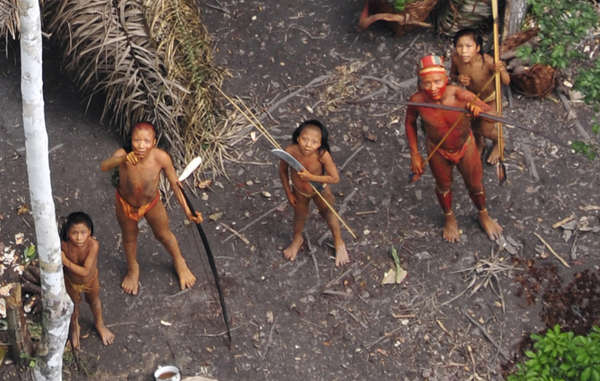
by Deep Green Resistance News Service | Jun 10, 2017 | Colonialism & Conquest
Featured image: The UN has condemned Brazil’s onslaught on indigenous rights, which threatens to wipe out uncontacted tribes © G. Miranda/FUNAI/Survival International
by Survival International
The United Nations and the Inter-American Commission on Human Rights have condemned Brazil’s “attack” on its indigenous peoples.
In a new statement, UN and IACHR experts have warned that Brazilian Indians are at great risk as politicians continue pushing to weaken their hard-won land rights.
Brazil’s constitution states that indigenous territories must be mapped out and protected for the Indians’ exclusive use. But anti-indigenous politicians linked to Brazil’s powerful agribusiness lobby are calling for changes to the law which could enable them to steal and destroy these lands for large-scale plantations and “development” projects. This is the most serious attack Brazilian Indians have experienced in decades.
Without their lands, indigenous peoples cannot survive. Tribes nationwide have united in protest against this onslaught on their rights. One indigenous leader, Adalto Guarani, said that the politicians’ plans “are like an atomic bomb… which could kill all the Indians in Brazil” and has called for people around the world to take action.
Brazil is home to over 250 tribes, including over 100 who are uncontacted and reject contact with mainstream society. Uncontacted tribes are the most vulnerable peoples on the planet. They face genocide and will be killed by disease and violence brought by invaders if their land is not protected, but the teams charged with keeping outsiders away are paralyzed by recent budget cuts.
The statement slams the “illegitimate criminalization” of indigenous peoples’ allies. The anti-indigenous agribusiness lobby instigated an inquiry whose recently published report attacked indigenous leaders, anthropologists, public prosecutors and NGOs, including Survival International. The report was met with outrage and incredulity in Brazil and beyond.
The experts also highlighted that over the last 15 years, Brazil has seen “the highest number of killings of environmental and land defenders of any country”. Dozens of indigenous leaders have been assassinated in recent years, following attempts to reoccupy their ancestral land, and last month, thirteen Gamela Indians were hospitalized after a violent attack by men armed with machetes in the Amazon.
The UN and the IACHR have recommended that “Brazil should be strengthening institutional and legal protection for indigenous peoples”.
Survival has launched a campaign to defend indigenous rights in Brazil.
by Deep Green Resistance News Service | May 20, 2017 | Colonialism & Conquest
Featured image: Indigenous protests in Brasilia, April 2017. © VOA
by Survival International
An inquiry established by Brazilian parliamentarians who represent the powerful agribusiness lobby has just published a report calling for the closure of the Indian Affairs Department, FUNAI.
Its findings have been met with outrage and incredulity in Brazil and beyond. Francisco Runja, a Kaingang spokesman said: “Killing off FUNAI is tantamount to killing us, the indigenous peoples. FUNAI is a crucial institution for us; our survival; our resistance; and it’s a guarantee of the demarcation of our traditional territories.”
The report attacks indigenous leaders, anthropologists, public prosecutors and NGOs, including Survival International.
It alleges that FUNAI has become a “hostage to external interests” and calls for dozens of its officials to be prosecuted for backing what it calls “illegal demarcations” of tribal territories.
Yesterday a group of 50 Indians was barred from attending the session in congress discussing the inquiry.
The inquiry took 500 days and the report is over 3,300 pages long. It is a blatant attack on indigenous peoples and a crude and biased attempt to destroy their hard-won constitutional rights.

Mutilated indigenous victim of ranchers’ attack in May 2017. © Anon
It was headed by politicians representing Brazil’s powerful agri-businesses who have long coveted indigenous territories for their own financial gain.
One member, congressman Luis Carlos Heinze, received Survival’s Racist of the Year award in 2014 following his deeply offensive remarks about Brazilian Indians, homosexuals, and black people.
Another member, congressman Alceu Moreira, called for the eviction of tribal people attempting to reoccupy their ancestral lands.
The increasingly hostile, anti-indigenous climate in many sectors in congress is fuelling violence against indigenous peoples. Last month, 22 Gamela Indians were injured following a brutal attack at the hands of local landowners’ gunmen.
FUNAI has suffered severe budget cuts, which have resulted in the grounding of several teams responsible for protecting uncontacted tribes’ territories. This effectively leaves some of the most vulnerable people on the planet to the mercy of armed loggers and land grabbers.
The organization has been greatly weakened. Many staff have been made redundant, and political appointees now run key departments.
In the last five months, it has had three presidents. Earlier this month the second president, Antonio Costa was dismissed. In a press conference he strongly criticized President Temer and Osmar Serraglio, the Minister of Justice, stating that they “not only want to finish off FUNAI, but also public policies such as demarcation of [indigenous] land… This is very serious.”
Yanomami shaman and spokesman Davi Kopenawa said: “FUNAI is broken… it is already dead. They killed it. It only exists in name. A nice name, but it doesn’t have the power to help us.”
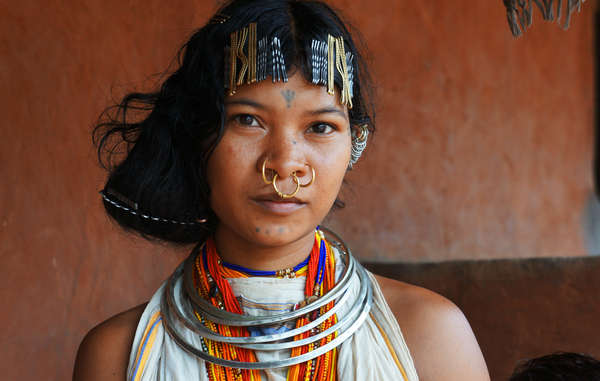
by Deep Green Resistance News Service | May 10, 2017 | Colonialism & Conquest, Mining & Drilling
Featured image: The Dongria have resisted attempts to mine in their hills for years, but are facing serious pressure to give in. © Survival International
by Survival International
The Indian government is harassing and attempting to silence the leaders of the Dongria Kondh tribe, famous for winning a “David and Goliath” court battle against a British mining giant.
The Dongria’s resistance to mining on their lands has continued since their landmark victory in 2014. Leaders including Dodi Pusika feel that the risk of mining remains as long as a refinery is operational at the foot of the Niyamgiri hills, an area which the tribe have been dependent on and managed for generations. A recent protest at the refinery was met with a baton-charge from police.
Pusika’s daughter-in-law, Kuni Sikaka, was arrested in the middle of the night of May 3 and accused of links with armed Maoist rebels. In exchange for her release, Dodi Pusika and other members of his family were made to “surrender” as Maoists and paraded in front of the media.
There has been an alarming increase in arbitrary, politically motivated arrests of tribal people who are resisting mining operations or government policies which endanger their lands and communities. Typically, those arrested are accused of Maoist links – usually without evidence.
Human rights activist and doctor Binayak Sen and tribal teacher Soni Sori have both been imprisoned for alleged Maoist connections and only subsequently released after national and international campaigns.
In April, the Home Ministry issued a report claiming that Maoists were “guiding the activities” of the Dongria’s organization, the Niyamgiri Suraksha Samiti (NSS). On the contrary, Maoists instructed the Dongria to boycott the very meetings at which they delivered their decisive “no” to mining.
Lingaraj Azad, a member of the NSS, stated, ‘We have always opposed violence – either State violence or Maoist violence. We will not bow down, but continue our struggle to protect Niyamgiri from being mined.’
Survival International is calling on the government to drop these fabricated charges, stop this persecution of the Dongria Kondh, respect their decision about the Niyamgiri mine, and to uphold their right to protect their lands and determine their own futures.
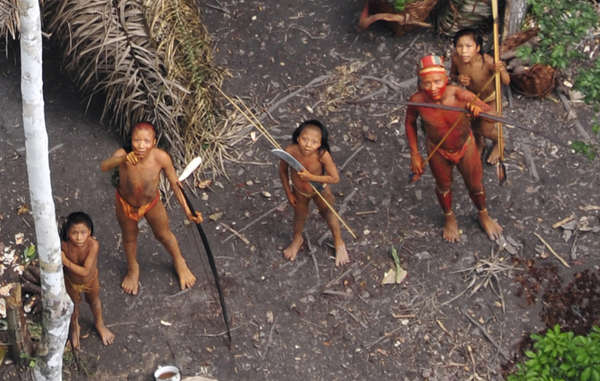
by Deep Green Resistance News Service | Apr 26, 2017 | Colonialism & Conquest
Featured image: Uncontacted tribes, like this one pictured in aerial footage seen around the world in 2011, now face genocidal attacks as Brazil’s government slashes funding for protection of their land. © G.Miranda/FUNAI/Survival
by Survival International
All the government units currently protecting Brazil’s uncontacted tribes from invasion by loggers and ranchers could be withdrawn, according to information leaked to Survival International. The move would constitute the biggest threat to uncontacted Amazon tribes for a generation.
Agents from FUNAI, the country’s indigenous affairs department, perform a vital role in protecting uncontacted territories from loggers, ranchers, miners and other invaders. Some teams are already being withdrawn, and further withdrawals are planned for the near future.
Thousands of invaders are likely to rush into the territories once protection is removed.
There are estimated to be over 100 uncontacted tribes in Brazil, well over two-thirds of the global population of uncontacted people. Many of them live in indigenous territories, which total over 54.3 million hectares of protected rainforest, an area about the size of France.
These territories are guarded by just 19 dedicated FUNAI teams. It is possible that all 19 teams could be eliminated from the Brazilian state budget, despite the fact that money spent maintaining these teams is equal to the average salaries and benefits paid to just two Brazilian congressmen per year.
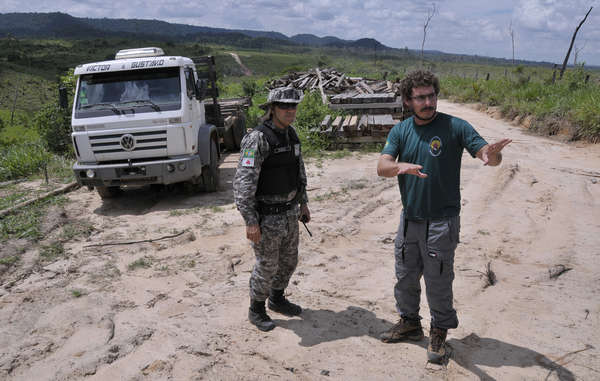
FUNAI agents in Brazil. Ground teams work full-time to keep invaders out of uncontacted tribal territory, but this vital protection could be withdrawn.
© Mário Vilela/FUNAI
The proposals are the latest in a long list of actions from the Temer government, which came to power in 2016 after the impeachment of Dilma Rousseff, that could have catastrophic consequences for indigenous peoples.
Indigenous activist Sonia Guajajara said: “By cutting down the FUNAI budget, the government is declaring the extinction of indigenous people.”
Paulo Marubo, an indigenous man from the Javari Valley in Brazil’s Amazon said: “If the protection teams are withdrawn, it will be like before, when many Indians were massacred and died as a result of disease… If the loggers come here, they will want to contact the uncontacted, they will spread diseases and even kill them.”
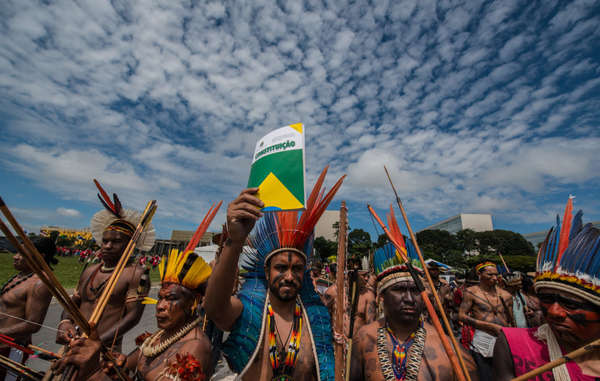
Indigenous protestors in Brasilia, Brazil.
© Fabio Nascimento / Mobilização Nacional Indígena
Campaigners have suggested that the government’s close ties to Brazil’s powerful ranching and agribusiness lobbies – which consider indigenous territories to be a barrier to their own expansion – could be part of the reason for the proposal.
Major indigenous protests are taking place this week in Brasilia against government proposals to water down protection for indigenous rights.
Uncontacted tribes are the most vulnerable peoples on the planet. Whole populations are being wiped out by violence from outsiders who steal their land and resources, and by diseases like flu and measles to which they have no resistance.
Survival International is leading the global fight for uncontacted tribes’ right to their land, and to determine their own futures.
Survival’s Director Stephen Corry said: “Cuts in government budgets to protect uncontacted tribes are clearly nothing to do with money – the sums involved are tiny. It’s a political move from agribusiness which sees uncontacted tribes as a barrier to profit and is targeting rainforest which has been off-limits to development. The reality is these cuts could sanction genocide.”
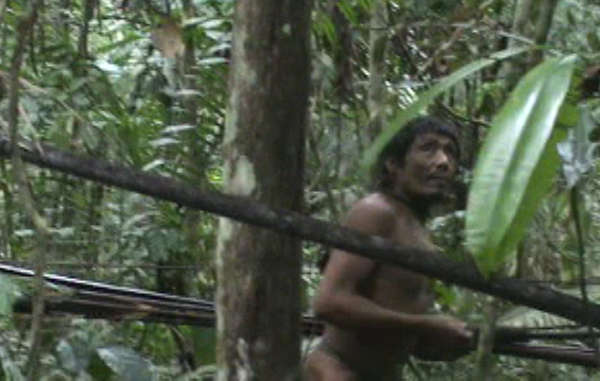
by Deep Green Resistance News Service | Apr 11, 2017 | Colonialism & Conquest
Featured image: The last of the Kawahiva are forced to live on the run. Still image from unique footage taken by government agents during a chance encounter. © FUNAI
by Survival International
Survival International has learned that politicians from a notoriously violent town in Brazil are lobbying behind the scenes to open up the territory of a vulnerable uncontacted tribe.
Councilors from Colniza in central Brazil, which is dominated by illegal logging and ranching and for years was Brazil’s most violent town, have met the Minister of Justice to lobby for the Rio Pardo indigenous territory to be drastically reduced in size. The minister is reportedly sympathetic to the councilors’ proposals.
Their plan is for road-builders, loggers, ranchers and soya farmers to move in, despite the territory being home to the last of the Kawahiva tribe, one of the most vulnerable peoples on the planet.
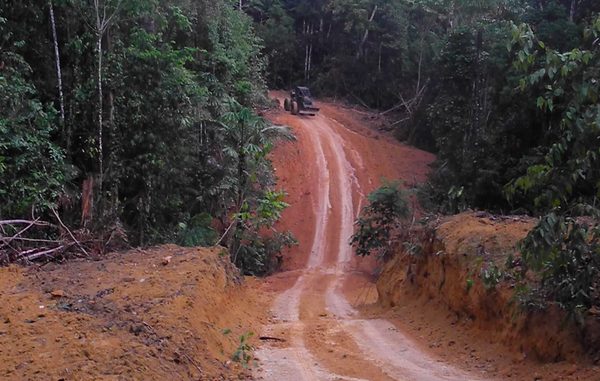
Armed loggers and powerful ranchers are razing the Kawahiva’s forest to the ground. © FUNAI
The Kawahiva depend entirely on the rainforest for survival, and have been on the run from loggers and other invaders for years.
The Rio Pardo territory was only recognized in 2016, following a global campaign by Survival International and pressure within Brazil.
Thousands of Survival supporters contacted the then-Minister of Justice demanding action. Oscar-winning actor and Survival ambassador Sir Mark Rylance fronted a major media push, culminating in the signing of the decree that should have secured the Indians’ territory for good.
Now, however, vested interests in the region could undo much of that progress.
Survival’s Director Stephen Corry said: “Brazil must respect the rights of its tribal peoples. Uncontacted peoples, like the Kawahiva, clearly want to be left alone and to live as they please. But Brazil’s current leaders are holding closed-door meetings with corrupt politicians, and kowtowing to the agribusiness lobby, expressly to deny them that right. The stakes could not be higher – entire peoples are facing genocide as a result of this callous approach.”
Background briefing
The Kawahiva are hunter-gatherers, who migrate from camp to camp through the Rio Pardo rainforest.
Roads, ranches and logging all risk exposing them to violence from outsiders who steal their lands and resources, and to diseases like flu and measles to which they have no resistance.
All uncontacted tribal peoples face catastrophe unless their land is protected. Survival International is leading the global fight to secure their land for them, and to give them the chance to determine their own futures.
The current Brazilian government is attempting to roll back decades of gradual progress in the recognition of indigenous peoples’ rights in the country. The Minister of Justice recently said: “Enough of all this talk of land [demarcation] – land doesn’t fill anyone’s stomach.” And the new head of Indigenous Affairs Department FUNAI has said “Indians can’t be ‘fixed in time.’”








